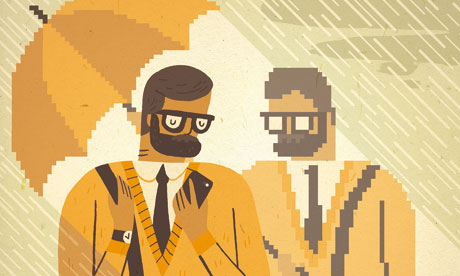
Recently, I've become preoccupied with the website If This, Then That (ifttt.com, supposedly pronounced "ifttt"), which is either a remarkably handy new tool or a portent of the end of humanity.
The insight behind it is that much of what we want to do online follows predictable sequences, where one event triggers another; Ifttt acts as "digital duct tape" for joining together these events. If that leaves you as baffled as I was when I first heard it, some examples may help. You could use Ifttt to send yourself a text in the morning – "Remember your umbrella!" – if, say, a weather website forecasts rain that day. You could have it post every photo you upload to Flickr to Facebook. Or email your stockbroker – for the purposes of this example, I'm pretending I have a stockbroker – if a share falls below a certain value. Other services exist to perform individual tasks like this, but Ifttt aspires to duct-tape the whole web. It's brilliant yet unsettling, evoking visions of the day when our online lives might run themselves without outside intervention, so that digital me could browse online, forward items of interest to friends, manage my money and answer emails while I dozed in a hammock. From there, it's surely only a short hop to digital me achieving independent consciousness and plotting my destruction. You mock, but I heard two latest-generation iPhones discussing such a scenario between themselves just the other day.
What's perhaps most illuminating about Ifttt, though, is that it suggests a useful way of thinking about many activities, online and off: our lives are full of "if this, then that" sequences that we perform automatically, without conscious thought. This often seems a bad thing: the pint of beer that triggers a cigarette, say, or the sitting on the sofa that triggers the reaching for the TV remote, and before you know it, it's three hours later. But the brain, it's long been recognised, couldn't function without automaticity: the demands on it are vastly too great to be handled entirely by conscious thought. "It is a general principle of psychology," observed the grandfather of the discipline, William James, "that consciousness deserts all processes where it can no longer be of use." Our lives are automated because they must be. A classic paper on the topic is entitled The Unbearable Automaticity Of Being.
One happy consequence of this, though, is the hope of reprogramming such sequences for our benefit, like Ifttt but for non-digital life. As several self-help authors note, one sneaky way to inculcate new habits is to "chain" them to things you already do. You have (one hopes) no problem remembering to brush your teeth in the morning, so add extra habits, one by one, in a sequence: "After brushing, I'll pack a healthy snack for work"; "When I've made my coffee, I'll email a friend I've fallen out of touch with." One of the biggest obstacles to developing new habits is simply forgetting them: automaticity dictates that we default to familiar grooves. Chaining combats that by duct-taping the new habit to something established. (Though you still have to remember the linkage.) You can't fight automaticity, and you wouldn't want to: "living more consciously" might be a new-age cliché, but take it literally and you'd soon seize up. What you can do is tweak it. We're doomed to live like robots, but at least we're also the ones who get to program the robots. For now.
oliver.burkeman@theguardian.com; twitter.com/oliverburkeman

